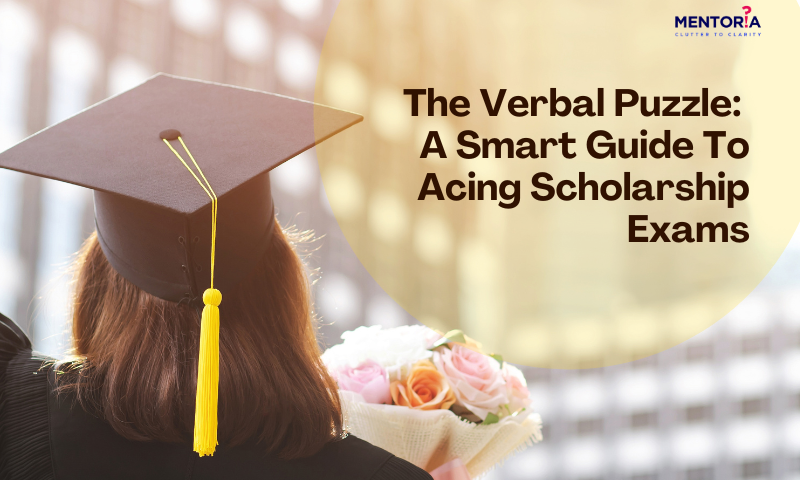The Verbal Puzzle: A Smart Guide To Acing Scholarship Exams

Unravelling the enigmatic art of verbal reasoning in scholarship exams can be as puzzling as deciphering hieroglyphics while blindfolded—utterly confounding! But fear not, for we are about to embark on a quest of wit, wisdom, and (yes, you guessed it) humour, to master the art of verbal reasoning and conquer those perplexing scholarship exams. As students gear up to conquer the trials of academia, mastering the art of verbal reasoning becomes a vital weapon in their scholarly arsenal. From deciphering perplexing wordplay to untangling the web of logical connections, the journey to verbal prowess promises a rollercoaster ride of intellectual acrobatics. So let’s get started.
The Importance Of Verbal Reasoning
Before we delve into the strategies, we need to understand why verbal reasoning is a critical aspect of scholarship exams. Verbal reasoning assesses your ability to comprehend written information, analyse arguments, and draw logical conclusions. It not only demonstrates your language skills but also your capacity to think critically and solve problems effectively. No wonder scholarship committees place great value on this section when evaluating candidates!
Strategy 1: Mastering Vocabulary
A rich vocabulary is a powerful tool when it comes to verbal reasoning. By expanding your vocabulary, you equip yourself with the ability to comprehend and respond to complex passages and questions effectively. According to Anderson and Freebody (1979), people who perform better on vocabulary tests do so because their verbal aptitude is better, and verbal aptitude is implicated in better text comprehension
- Reading Diversity: Engage with various materials—books, articles, newspapers, and blogs—for exposure to different words.
- Flashcards: Create flashcards to memorise new words, and regularly review them for reinforcement.
- Word Games: Enjoy word games like crosswords and quizzes for enjoyable vocabulary enrichment.
- Immerse in Reading: Reading extensively deepens word knowledge and understanding of contextual usage.
- Daily Practice: Dedicate consistent time to learning new words and practising their usage.
- Contextual Learning: Understand word meanings in context to grasp nuances and subtle variations.
- Apply and Write: Incorporate newly learned words into writing to solidify retention and application.
Strategy 2: Decode Context Clues
The context is your ally when facing unfamiliar words or phrases in verbal reasoning questions. Context clues are the hints provided within the text that can guide you to understand the meaning of difficult words. By carefully examining the sentences surrounding the unknown term, you can deduce its definition and enhance your comprehension. This approach encourages critical thinking and problem-solving skills, making it an essential strategy to master. However, it is important to note that context clues are not always reliable. In some cases, the context may be ambiguous or the unknown word may have multiple meanings. It is important to use context clues in conjunction with other decoding strategies, such as using a dictionary or thesaurus.
Strategy 3: Tackle Analogies With Logic
Analogies can be puzzling, but they become more manageable when approached logically. When presented with an analogy question, focus on the relationship between the first two words and identify the pattern that connects them. Then, apply the same logic to deduce the missing link, arriving at the correct answer. Employing logical reasoning can significantly improve your analogy scores. Practice with analogy exercises to strengthen your logical reasoning skills and boost your confidence in tackling these questions.
Strategy 4: Practise Active Reading
Active reading is a game-changer when it comes to verbal reasoning. Engaging with the text, asking questions, and summarising key points as you read helps you internalise information more effectively. To become an active reader, focus on understanding the main ideas, identify supporting evidence, and question the author’s intent. Take notes as you read and highlight essential details to aid comprehension. Active reading not only enhances your verbal reasoning abilities but also deepens your overall understanding of the material.
Strategy 5: Mind The Clock
Time management is crucial in any exam, and verbal reasoning is no exception. Allocate time wisely to each question, ensuring you have sufficient time to review your answers. To mind the clock, practice with timed exercises and simulate real exam conditions. Develop a mental schedule for each question, and if you encounter a challenging one, move on and come back to it later. Staying calm and composed while managing time will boost your confidence and ensure you can tackle all verbal reasoning questions with ease.
Strategy 6: Embrace Mock Tests
Mock tests are your secret weapon in preparation for scholarship exams. Engaging in regular practice with mock tests not only builds your confidence but also familiarises you with the exam format and question types. Use mock tests to identify your strengths and weaknesses, and tailor your study plan accordingly. Analyse your performance in each test, focusing on areas that need improvement. Mock tests offer an opportunity to refine your verbal reasoning skills, boost your self-assurance, and optimise your performance on the actual exam day.
Strategy 7: Analyse Passage Structure
To excel in verbal reasoning, it’s essential to understand the structure of passages and identify the main ideas, supporting evidence, and key arguments presented. Real statistics indicate that candidates who demonstrate strong passage analysis skills tend to score significantly higher in this section.
When approaching a passage, take a moment to scan through it and grasp the overall theme and purpose. Identify the introduction, body paragraphs, and conclusion, and pay attention to the transition words used to link ideas. By recognising the organisation of the passage, you can efficiently navigate through questions that refer to specific sections or ask about the author’s intention.
Strategy 8: Cultivate Critical Thinking
Verbal reasoning is not just about memorising facts; it’s about demonstrating critical thinking skills. Cultivate your ability to analyse information, evaluate arguments, and draw logical conclusions from the text. Practice analysing arguments and identifying flaws in reasoning. Look for evidence to support claims and assess the reliability of sources. Engage in discussions and debates to sharpen your critical thinking abilities. As you hone these skills, you’ll become adept at untangling complex verbal reasoning questions and arriving at well-reasoned responses.
- Analyse Information: Break down the text into its components—conclusion, premises, evidence. Understand the context and main ideas thoroughly.
- Evaluate Arguments: Scrutinise the logical structure. Identify assumptions, fallacies, and gaps in reasoning that weaken the argument’s foundation.
- Draw Logical Conclusions: Based on the evidence provided, derive conclusions that logically follow. Avoid making assumptions beyond what’s supported.
- Assess Source Reliability: Investigate the credibility of sources. Consider expertise, bias, and relevance to determine the trustworthiness of information.
- Engage in Discussions: Participate in debates and discussions on diverse topics. Listen actively, ask probing questions, and construct well-reasoned responses.
- Identify Flaws: Spot logical fallacies like circular reasoning, appeals to emotion, or hasty generalisations in arguments you encounter.
- Seek Evidence: When claims are made, ask for supporting evidence. Evaluate whether the evidence is sound, relevant, and credible.
- Practise Socratic Dialogue: Engage in thoughtful conversations by using the Socratic method—asking questions to delve deeper into arguments.
- Reflect and Review: After discussions or analyses, reflect on strengths and areas for improvement. Continuously refine your critical thinking skills.
Mentoria – Your Guide To Scholarship Success
Verbal reasoning is a critical skill in scholarship exams, and with the right strategies, you can master this challenge with confidence. By implementing the techniques discussed in this blog, you’ll be well-prepared to tackle verbal reasoning questions, analyse complex texts, and showcase your critical thinking abilities.
At Mentoria, we recognize the importance of excelling in verbal reasoning for scholarship exams. Our expert tutors are here to support you on your journey to scholarship success. With personalised coaching and tailored study plans, we’ll help you build the verbal reasoning skills and confidence needed to shine in your exams.
Our comprehensive approach combines practice sessions, mock exams, and targeted feedback to address your unique areas of improvement. Whether you’re a high school student preparing for scholarship exams or a college applicant seeking financial aid, Mentoria is your partner in achieving academic excellence.
So, don’t let verbal reasoning hold you back from your scholarship dreams. Let Mentoria equip you with the tools and strategies to conquer verbal reasoning and unlock a world of educational opportunities.









